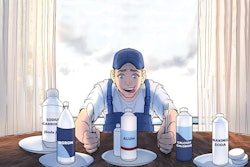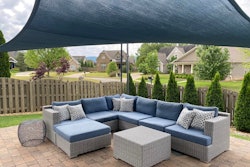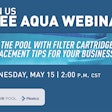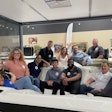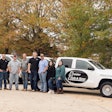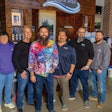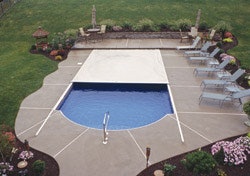
But like every other segment of the pool market, the recession has forced a reevaluation of the primary business model. Automatic pool covers have been vulnerable in this downturn because traditionally, the product has been sold as part of a new pool package.
Unfortunately, that part of the industry (new pools) has seen some of the most dramatic losses. This difficult but transitory period of reduced pool starts is forcing automatic pool cover manufacturers, dealers and distributors to take a fresh look at their sources of income.
Some have geared up sales to increase their closing rate on the smaller group of new pools, while others have cast their eyes toward the enormous untapped market of existing, uncovered pools.
And one manufacturer has tapped an entirely new market for automatic pool covers - the oil-change business - which must cover its service bays to meet OSHA regulations.
On the whole, this response to a weakened market has been aggressive and creative, and serves as a guide to other companies struggling through the downturn.
"The current economic climate has prompted us to look for greater efficiencies to get our covers to customers - from promotion to ordering to production to delivery," says Rick Clark, founder, Cover-Pools, Salt Lake City.
Retro Covers
In navigating the turbulent waters of recession, the automatic pool cover industry has had some natural advantages. It's more fortunate than some segments of the pool industry in that automatic covers are adaptable to both new and existing pools. (Products and services tied exclusively to new building have suffered the most in the past year, while consumers have remained willing to spend on upkeep and accessories for existing pools.)
When the pool industry was booming, that flexibility was less appreciated, says Wesley Mathis, founder, Pool Cover Specialists National, West Jordan, Utah. Sales for covers on new pools came relatively easily, and there seemed to be no urgent reason to pursue the aftermarket.
"But I think the recession has forced us to think harder about the business. We were so busy just taking care of dealers on new pools that that market was neglected. But with the recession, new construction is down. And if 90 percent of your market is new construction and it's down 50 percent, that means you are down close to 50 percent, too.
"Three years ago," he points out, "if I had my salespeople contact builders across the country (and I'm talking about four-season builders now, because those are the ones that really embrace automatic pool covers) and suggest to them they should try to get into the aftermarket when times are slow in the winter, they would have laughed at me and said, 'Don't talk to me about aftermarket. I don't want any more business, I'm going to Florida.'
All that has changed, Mathis says, and the company has changed its pitch to the people who sell covers. "We've contacted builders and others across the country [suggesting an aftermarket approach], and I don't think we've had a single one that didn't say, 'That's an excellent idea.'"
At Cover-Pools, Clark has seen a similar rise in aftermarket interest. "We're hearing more from builders who are seeking new opportunities to increase revenues by selling pool covers," he says. "Current pool owners are an obvious focus for cover sales since they're familiar with the costs and maintenance associated with pool ownership."
One dealer that has broadened the scope of his client base to include the retrofit market is Dennis Flack, owner of Morton Aquatech Pools & Spas in Morton, Ill.
"We're doing a lot of retrofits, no question about it," Flack says. "Three times the amount we did five years ago. Some of the work is replacing a cover that's worn out, and some of it is putting a new cover on a pool that never had one.
"It's become a bigger part of our business, that's for sure, because of the economy. That and liners have really helped because the new pools themselves are really few and far between."
This approach makes sense because Morton Aquatech already has a service staff in the field, talking with customers. It's not a difficult transition, Flack says, to move the topic of conversation from heaters and skimmers to pool covers.
Foreclosed Pools
Within the retrofit, existing pool market, a potential submarket for pool covers has grown up alongside the recession - foreclosed homes with pools. These homes are under the control of banks and management companies, and the pools that sit behind them are hazards that could become huge legal liabilities if left without covers.
In California alone, there are literally hundreds of thousands of homes in foreclosure, a large percentage of which have pools without covers to keep children out. Mathis says the mortgage-holding companies that control them are being pressured by insurance carriers to do something about the uncovered pools, and this is an opportunity to sell literally thousands of covers during the recession.
The key to making a foreclosed-pool-cover-sales program work, he says, is to develop a turnkey plan for dealers which includes detailed instruction on (1) how to find foreclosed homes, (2) who to contact when they become aware of a foreclosed home - a simple drive through neighborhoods that are high risks for foreclosures will yield vast numbers of potential customers - and provide ready-made marketing materials they can use immediately (3) how to approach the mortgage-holders, and (4) how to figure out what kind of cover is suited for a particular pool (i.e., automatic, mesh, solid-vinyl, etc.). For instance, if a pool is drained, a mesh cover is more suitable than an automatic or a solid-vinyl cover.
Once a pool-cover dealer has established a relationship with a property management company or bank, those institutions will give all their foreclosed-homes-with-pools business to that dealer, leveraging the effort the dealer has to expend upfront.
Stretch
The take-home message, as demonstrated by these enterprising manufacturers and dealers, is that when times are thin, businesses need to stretch. And reach beyond their core markets.
It's expected, says Michael Shebek, president, Automatic Pool Covers, Fishers, Ind. "When times get hard, pool cover dealers and distributors are more open to change. In anticipation of that we ramped up our support staff and got samples out. There are a lot more requests for information now."
However, Shebek believes that, to an extent, the continued success of this product is a simple matter of its appeal spreading through communities from person to person.
"Certain markets have become accustomed to the automatic pool cover. The more covers that go in - the more you get into a specific market - it becomes the standard.
"Here in Indiana, there are builders that put automatic pool covers on 95 percent of their new pools. There are probably 40 or 50 dealers like that here. And Minnesota is the same way. It's just like salt generators, once people see them and have friends that have them, they become a staple."
Comments or thoughts on this article? Please e-mail [email protected].
Jiffy Lube
It dawned on one automatic pool cover manufacturer that the maintenance-bay pits at quick oil change stations were pretty much identical to pools - minus the water.
And once the company discovered that OSHA requires those maintenance-bay pits to be completely covered at all times when vehicles weren't being serviced above the pits, "it occurred to us," says Wesley Mathis, founder, Pool Cover Specialists National, West Jordan, Utah, "that we could provide those lubrication companies with a faster, more convenient way to cover and uncover those bays (dozens of times a day) by installing automatic pool covers over them."
The concept has worked so well that PCS is now a corporation-sanctioned, internationally approved vendor for Jiffy Lube, providing its outlets with proprietary and patent pending "automatic maintenance-bay covers," which are essentially automatic swimming pool covers adapted to that application. In fact, PCS has been invited to attend the national convention of Jiffy Lube franchisees to promote its maintenance bay covers to them. And, as Mathis points out, "That's just a drop in the bucket in the worldwide market."
- S.W.
























